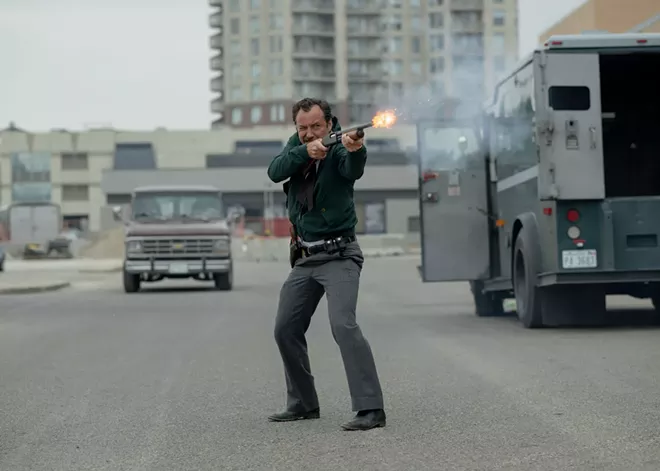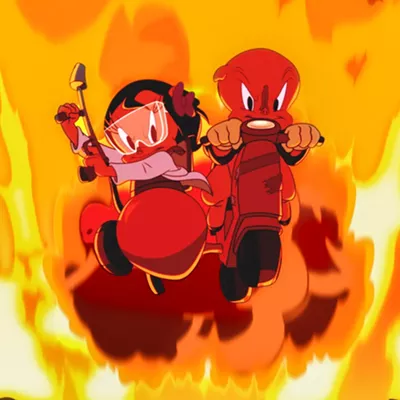In December 1983, the militant white supremacist group The Order robbed a Spokane bank in what was believed to be their first armed escalation of many. They did so with the intention of using the stolen funds to start a race war in the United States after discovering that their original means of raising funds — the hard work of logging — was far too difficult after only a day of doing so. The robbery is portrayed early on in director Justin Kurzel's sturdy yet sinister crime thriller The Order, and marks the beginning of an effective descent into darkness that remains relevant all these decades later. It's an often razor-sharp, well-constructed genre film, feeling almost like Michael Mann's Heat in parts, while still taking a long, hard look at the poisonous ideology of hate that grabbed hold of the region (and many like it) in a cruel country that remains on the brink.
Based on the 1989 nonfiction book The Silent Brotherhood, the screenplay by King Richard writer Zach Baylin is stripped down and without pretense. There are hateful men setting out to take down the government in order to murder anyone they don't like — be they Black, Jewish or anything less than lily-white. Their depraved delusions of grandeur are ludicrous, yet still dangerous. We are given glimpses into their pasts, but what mostly matters is they are driven by a shared sense of aggrievement that they are looking to blame on whatever scapegoats they can find. Their leader is the real-life Bob Mathews, played well by Nicholas Hoult, who moved to the northeast corner of Washington state and started the group after serving time for tax fraud. He's being pursued by the troubled FBI agent Terry Husk, potrayed by the great Jude Law in one of his better films since 2012's The Nest. Husk, while fictional, serves as an amalgamation of several real-life FBI figures. And he soon discovers how baked in the hate has become.
Critically, this is no valorous portrait of how the police and the FBI ride in to save the day. Early on, when Husk attempts to ask the simplest of questions about the white supremacist group, he is not taken seriously. Even when he meets a local police officer who is actually paying attention, played by a committed Tye Sheridan (Ready Player One), they must make up for lost time due to local cops largely looking the other way. In one standout scene, we see Mathews taking part in a tense meeting with a different, older white supremacist on a hauntingly framed, desolate road. He is told to stop with the robberies, though only because there is concern it could draw attention to them all as they try to covertly infiltrate police departments and the offices of elected officials. It is the most chilling moment in a film that increasingly finds plenty of them.
While it is disappointing that a local story like this was shot not in the state and instead made (as many are) in Canada, the film still creates a sense of PNW dread that you can feel hanging over every frame.
What gives The Order a propulsive energy and greater resonance is not just Kurzel's strong direction, which proves to be just as good at creating an unsettling tone as his 2021 film Nitram, but the evocative score by his brother, Jed Kurzel. It is a terrifyingly thunderous roar under the vast landscapes, providing it all with a sense of impending violence in one moment and an eerie echo in another. The soundscape serves as the beating heart of the experience. Even when the film gets too caught up in familiar genre beats — with one hunting scene proving to be far too cheeky for its own good — the technical elements ensure The Order cuts deep when it builds to an inevitable and fiery conclusion on Whidbey Island.
(Big time spoiler alert for those unfamiliar with this grim chapter in Washington history — stop now if you want to watch The Order without knowing the ending.)
Kurzel crucially resists any framing that could let Mathews again become a martyr. Mathews was a man who held great sway, convincing his followers to join a hateful cause, but he's also one who died alone, crying and vomiting in the smoke of a battle that he hoped would bring him mythic status. Though some modern white supremacists still hold him in this regard, The Order grants him no courageous last stand. It provides a more truthful portrait of how, when all the gunfire came to an end, all that was left was a sad little man whose life was defined by hate.
Kurzel never lets spectacle subsume this reality as he leaves us with a lingering final note of quiet dread, reflecting on the racist violence that persists in corners throughout the country. No matter how diligently men like Husk work to keep it in their sights, the hateful poison remains. ♦
![]()
The Order
Rated R
Directed by Justin Kurzel
Starring Jude Law, Nicholas Hoult, Tye Sheridan, Jurnee Smollett

















